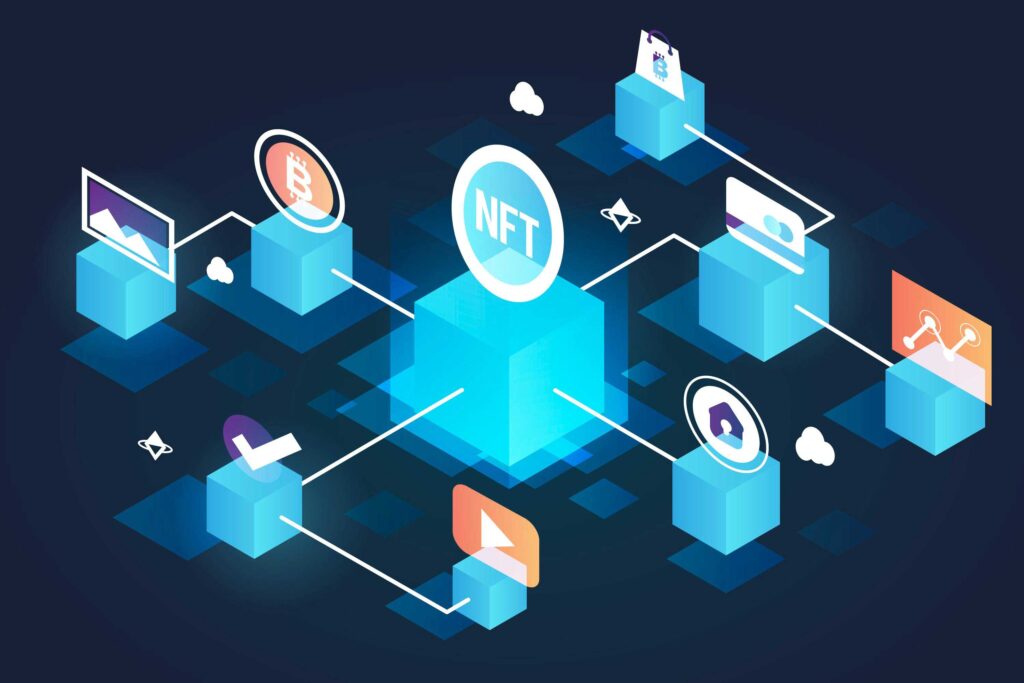Welcome to my blog about blockchain! In this blog, I will be exploring the exciting world of blockchain technology. We will take a look at what blockchain is, its benefits, types, applications, and the challenges it faces. By the end of this blog, you will have a better understanding of the technology and its potential to revolutionize the way we do business. So, let’s dive in and explore the fascinating world of blockchain!
What is Blockchain?
Blockchain is a revolutionary technology that has the potential to revolutionize the way we store, manage, and transfer data. It is a distributed, decentralized digital ledger that records transactions across many computers in a secure and immutable way. By using cryptography and consensus mechanisms, blockchain technology ensures that the data stored on the ledger is secure and tamper-proof.
Definition of Blockchain:
Blockchain is a distributed ledger technology that enables secure, immutable, and transparent storage and transfer of data. It is a shared, immutable ledger for recording the history of transactions. It is a distributed database that is managed autonomously using a peer-to-peer network and a consensus mechanism.
How it works:
Blockchain works by using a peer-to-peer network of computers to store and manage data. Each node in the network stores a copy of the ledger, and these copies are constantly compared and updated to ensure that the data stored is secure and accurate. When a new transaction is added to the blockchain, it is validated by the network, and then added to the ledger. Once a transaction is added to the ledger, it is immutable and cannot be changed.
Components of Blockchain:
Blockchain is composed of several components, including nodes, miners, consensus mechanisms, and smart contracts. Nodes are computers that store and manage data on the blockchain. Miners are computers that validate transactions and add them to the blockchain. Consensus mechanisms are algorithms used to ensure that all nodes in the network agree on the state of the ledger. Smart contracts are self-executing contracts that can be used to automate transactions on the blockchain.
Use Cases:
Blockchain technology has a wide range of potential applications, including financial services, healthcare, supply chain management, voting, and digital identity management. In the financial services industry, blockchain technology can be used to create secure and transparent payment systems. In healthcare, blockchain technology can be used to securely store and transfer patient data. In supply chain management, blockchain technology can be used to track the movement of goods and ensure the authenticity of products. In voting, blockchain technology can be used to ensure secure and transparent elections. In digital identity management, blockchain technology can be used to securely store and manage digital identities.
Conclusion:
Blockchain is a revolutionary technology with the potential to revolutionize the way we store, manage, and transfer data. It is a distributed, decentralized digital ledger that records transactions across many computers in a secure and immutable way. By using cryptography and consensus mechanisms, blockchain technology ensures that the data stored on the ledger is secure and tamper-proof. It has a wide range of potential applications, including financial services, healthcare, supply chain management, voting, and digital identity management.

Benefits of Blockchain
Blockchain technology has revolutionized the way we think about data, security, and trust. With its distributed ledger technology, blockchain offers a number of advantages that can help organizations of all sizes improve their operations. Here are some of the key benefits of blockchain technology:
Immutability:
Blockchain technology is immutable, meaning that data stored on the blockchain cannot be changed or tampered with. This provides an added layer of security, as the data is permanent and cannot be changed without the consensus of all participants in the network.
Transparency:
All transactions on the blockchain are visible to all participants in the network, providing an added level of transparency. This can help to reduce fraud and corruption, as all transactions are visible and can be easily tracked.
Security:
Blockchain technology is secure, as it uses cryptography to ensure that data is only accessible to those who have the appropriate access rights. This ensures that data is kept safe and secure, and that unauthorized users cannot access it.
Cost Savings:
Blockchain technology can help to reduce costs associated with transactions, as it eliminates the need for a third-party intermediary. This can help to reduce transaction costs and allow for more efficient use of resources.
Trustless System:
Blockchain technology is trustless, meaning that transactions are verified and secured without the need for a third-party intermediary. This eliminates the need for a central authority, and allows for more secure and efficient transactions.
These are just some of the benefits of blockchain technology. As the technology continues to evolve, more and more organizations are beginning to recognize the potential of blockchain and its ability to revolutionize the way we store and manage data.

Types of Blockchains
Blockchain technology has evolved since its inception and now there are several types of blockchains available for different use cases. These include public blockchains, private blockchains, consortium blockchains, and hybrid blockchains. Each of these types of blockchains has its own unique characteristics and benefits.
Public Blockchains:
Public blockchains are open to anyone and are completely decentralized. This means that all participants in the network have equal access to the data and the ability to verify and validate transactions. These networks are also immutable, meaning that once a transaction has been recorded, it cannot be changed or reversed. This makes public blockchains a great choice for applications that require transparency and trust.
Private Blockchains
Private blockchains are closed networks that are not open to the public. This type of blockchain is typically used by businesses that want to keep their data and transactions private. Private blockchains are more secure than public blockchains as they are not open to the public and only authorized users can access the data.
Consortium Blockchains:
Consortium blockchains are a hybrid of public and private blockchains. This type of blockchain is managed by a pre-selected group of participants, rather than a single entity. This allows for greater control over the network while still providing the benefits of decentralization.
Hybrid Blockchains:
Hybrid blockchains are a combination of public and private blockchains. This type of blockchain allows for the use of both public and private ledgers and can be used to create a secure and efficient system for transactions.
No matter what type of blockchain you choose, it is important to understand the benefits and drawbacks of each type. This will help you decide which type of blockchain is best suited for your needs.

Applications of Blockchain
Blockchain technology has the potential to revolutionize many industries, from finance and healthcare to supply chain and smart contracts. In this chapter, we’ll explore some of the most promising applications of blockchain technology.
Finance:
One of the most notable applications of blockchain technology is in the finance industry. Blockchain can be used to make payments faster, more secure, and more transparent. It can also be used to facilitate the trading of securities and other financial instruments, as well as to track the ownership of assets.
Healthcare:
Blockchain technology can also be used in the healthcare industry to securely store and share patient data. This data can be used to improve the accuracy and efficiency of medical treatments, as well as to reduce the risk of data breaches.
Supply Chain:
Blockchain technology can be used to track the movement of goods throughout the supply chain. This can help to reduce costs and improve the efficiency of supply chain operations.
Smart Contracts:
Smart contracts are applications that run on blockchain technology and are used to automate certain types of transactions. They can be used to facilitate contracts between parties, as well as to automate the execution of certain tasks.
In summary, blockchain technology has the potential to revolutionize many industries, from finance and healthcare to supply chain and smart contracts. By leveraging the features of blockchain technology, businesses can reduce costs, improve efficiency, and increase security.

Challenges of Blockchain
Blockchain technology is still in its early stages of development. As such, there are a number of challenges that need to be addressed before it can be widely adopted. These challenges include scalability, interoperability, privacy, energy consumption, and regulatory uncertainty.
Scalability:
One of the biggest challenges facing blockchain technology is scalability. The current blockchain networks are limited in terms of their ability to process large amounts of data, which can limit their usefulness in certain applications. To address this, developers are exploring various solutions, such as sidechains and sharding.
Interoperability:
Another challenge facing blockchain technology is interoperability. Different blockchains are not able to communicate with each other, which limits their usefulness in certain applications. To address this, developers are exploring various solutions, such as atomic swaps and cross-chain communication protocols.
Privacy:
Another challenge facing blockchain technology is privacy. While blockchain networks are secure, they are not always private. To address this, developers are exploring various solutions, such as zero-knowledge proofs and privacy-preserving protocols.
Energy Consumption:
Another challenge facing blockchain technology is energy consumption. The current blockchain networks are energy-intensive, which can limit their usefulness in certain applications. To address this, developers are exploring various solutions, such as proof-of-stake and other energy-efficient consensus mechanisms.
Regulatory Uncertainty:
Finally, another challenge facing blockchain technology is regulatory uncertainty. Governments around the world are still figuring out how to regulate blockchain technology, which can limit its adoption. To address this, developers are exploring various solutions, such as self-regulatory organizations and industry standards.
In conclusion, blockchain technology is still in its early stages of development, and there are a number of challenges that need to be addressed before it can be widely adopted. These challenges include scalability, interoperability, privacy, energy consumption, and regulatory uncertainty. However, developers are exploring various solutions to address these challenges, which could lead to blockchain technology becoming more widely adopted in the future.

Conclusion
The blockchain technology has revolutionized the way we store and share data. It has opened up a world of possibilities for data storage, data sharing, and transactions. Blockchain technology has the potential to revolutionize the way we do business, store data, and interact with one another. It is a powerful tool that can be used to increase efficiency, reduce costs, and provide a secure environment for data storage and sharing.
Blockchain technology has the potential to revolutionize the way we store and share data, interact with one another, and conduct business. However, there are still many challenges and potential risks to consider before implementing blockchain technology. It is important to understand the different types of blockchains, the benefits and applications of blockchain technology, and the challenges that come with implementing blockchain technology.
By understanding the potential of blockchain technology, businesses and individuals can make informed decisions on how to best use this technology to their advantage. Blockchain technology has the potential to revolutionize the way we store and share data, interact with one another, and conduct business. With the right implementation, blockchain technology can provide a secure and efficient environment for data storage and sharing.



